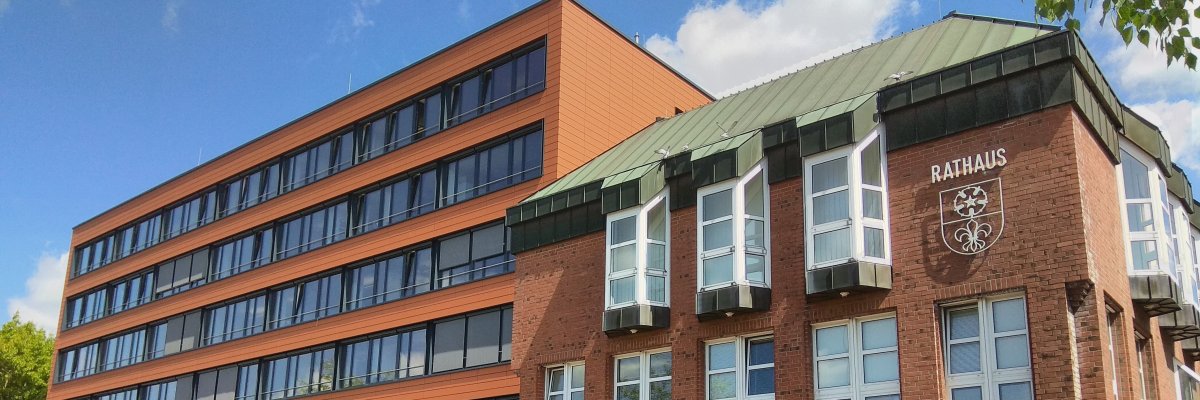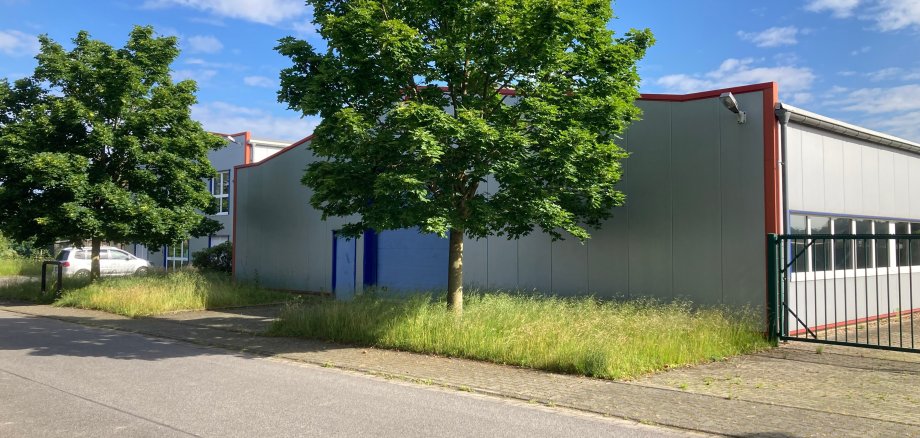The pilgrimage town of Kevelaer - like all municipalities in NRW - has been dealing with an increased allocation of refugees by the state of NRW (specifically: Arnsberg district government, special responsibility for the whole of NRW) since 2015. Neither the respective city administration nor the respective city council has the authority to decide whether and how many refugees are accommodated in the municipality. This is a mandatory task for the municipalities to fulfill according to instructions; the mayor and the city administration are the recipients of orders here. The district administrator also has no decision-making authority here. The assigned task is to be carried out by the respective municipality.
Initially, the problem was solved from 2016 by renting the sports hotel on Grotendonker Straße with a capacity of around 200 beds, among other things. After five years, the rental contract expired during a phase with only a few new arrivals and was not extended. A few months later, the influx of refugees increased massively once again due to the outbreak of war in Ukraine in February 2022 and various other crises around the world, such as the withdrawal of Western troops from Afghanistan and the Taliban coming to power. More people are also coming to us from other countries, such as Syria, Iraq, Turkey and various African countries. It was no longer possible to rent the sports hotel again due to a change of ownership. The city then tried to cushion the situation by renting or buying buildings, which ultimately proved insufficient. The Croatian gymnasium on Jahnstraße had to be used and has been permanently occupied ever since, with a brief interruption. When the youth hostel on Schravelen unexpectedly ceased operations at the end of 2022, the city initially tried unsuccessfully to rent or possibly buy the youth hostel for accommodation. A later attempt by the state of North Rhine-Westphalia to rent the youth hostel in order to operate a state facility there, which would have counted towards Kevelaer's allocation quota, also failed in the fall of 2023; no agreement was reached with the German Youth Hostel Association. In the meantime, the town continued to look for accommodation options.
In this context, the city administration presented several locations, primarily urban areas, at a meeting of the Committee for Climate, Environment and Facility Management on February 9, 2023 in the non-public section, where accommodation for refugees is at least theoretically conceivable. It was explained that the building at Rheinstraße 102 could be rented in the short term. However, it was already clear at this point that it could only be rented for a maximum of two years. The building was rented and currently accommodates 62 people. The rental agreement expires at the end of January 2025. The locations Rosenbroecksweg (behind the depot), Ladestraße and Alte Heerstraße were proposed by the administration at the meeting and agreed by the committee in the prioritization. A refugee shelter with approx. 100 beds is currently being built at the Ladestrasse site. From the fall, another refugee shelter of the same size will be built at the Rosenbroecksweg site. On the Alte Heerstraße site, on the other hand, affordable housing is to be built, of which there is currently far too little in Kevelaer. This project is currently in the development planning process. In this respect, the priority list from the submission has been completed.
In addition to the Croatian gym, the Hubertus elementary school gym has also been occupied by 35 refugees since summer 2023. The school was promised in advance that the hall would be used to accommodate refugees for a maximum of one year and would then be made available to the school (and clubs) again. This gym is therefore to be vacated during the summer vacations. At the end of 2023, the city also rented the Altes Pastorat building in Winnekendonk. It currently accommodates 28 people. However, this lease expires at the end of 2024.
The current situation is that the pilgrimage town of Kevelaer has accommodated a total of 736 people, 580 of whom live in the area of Kevelaer Mitte and 110 in the area of Winnekendonk. Doctors, pharmacies and supermarkets are available there. So far, the city has managed to almost completely exclude the three smaller villages from the occupancy rate (currently Twisteden 18 people, Wetten 12 people, Kervenheim 16 people, including 12 German homeless people in Winnekendonker Straße 1).
As various rental contracts expire at the end of the year and around 100 people will then need new accommodation, the capacity of the accommodation currently under construction on Ladestrasse is already exhausted. The occupancy of a second gymnasium should also be avoided at all costs. Of course, it would also be desirable to free up the Croatian gymnasium. However, this is completely unrealistic in the coming months. The state has announced that the local authorities can once again expect increased allocations in the summer months.
Against this backdrop, the purchase of the Boemsfeld 9 commercial property, which had been up for sale for some time, came before the political committees at the end of 2023. The state had just announced that the negotiations for the youth hostel had failed and there were no serious alternatives on the market. This submission was also dealt with in the non-public section because all property matters (such as personnel matters) must be dealt with in the non-public section. Martin Brandts took the floor as a member of the council and head of Kervenheim and explained the concerns and worries of the citizens of Kervenheim in detail. After further discussion, the topic was postponed to the Council, where the agenda item was then finally dealt with on December 19, 2023. Here, the mayor once again stated that the purchase of land was not a particularly good option, but that there were no better options. A controversial discussion ensued in which alternatives were also discussed. A request was made from the city council to vote by secret ballot, which was accepted by a majority. The council then decided by secret ballot with a narrow majority in favor of purchasing the site. Social care was already discussed at the meeting, as were the problems at Winnekendonker Strasse 1.
The property was subsequently acquired. The purchase has now been completed. Following this, concrete planning began.
FAQ:
When does the occupancy start? How many people will be accommodated in the Xantec hall? Should families or men traveling alone be accommodated there?
Occupancy is scheduled to begin during the summer vacations and will coincide with the vacating of the Hubertus gymnasium. The hall itself is designed for a maximum of 9 x 6 people. As the plan is to occupy the hall with families and not every family comprises six people, an average occupancy of 45 people should be realistic. A kitchen and sanitary facilities are available in the hall or will be created in sufficient size. In addition, six further apartments can be created in the adjoining offices. It is also intended to accommodate families here at a later date.
Who can I turn to if there are problems with the property or with the refugees, who is the contact person in the administration?
Please contact the public order office, either by e-mail: ordnungsamt@kevelaer.de or by telephone on 02832 122-832.
Have there been any difficulties with refugees in Kevelaer recently, especially in the larger accommodation facilities?
There have hardly been any incidents in recent years. The accommodation right next to Hubertus Primary School was also completely quiet last year and there were no incidents.
Should there be social and everyday support for the refugees? To what extent? Does this also include support with regard to asylum and immigration law issues?
Social and day-to-day support from a social services provider has already been agreed for a half-time position, i.e. 20 hours per week. The contract for this has yet to be concluded. If it turns out that there is a greater need, this will be followed up. This has been discussed with the provider. Advice on asylum and immigration law issues is offered at the Caritas Center in Kevelaer - as for all refugees in Kevelaer.
Who else looks after the property and the people who live there?
The city will carry out a daily inspection by one of the asylum janitors. The Refugee Round Table has already agreed to help look after the facility and its residents. The inspection by a security service, as is currently carried out in all accommodation facilities in Kevelaer up to and including June 30, is the subject of the negotiations currently taking place with the security service regarding a city-wide extension of the contract from July 1.
For example, how is the food supply to be ensured? Are the public transportation connections sufficient?
The Kervenheim citizen bus currently runs from 08.00 -14.00 via Winnekendonk to Kevelaer and back (15.00 end in Kervenheim). Due to a shortage of drivers, there are currently only 5 trips a day from Monday to Friday. There are three trips on Saturdays (09.30 - 12.30). On school days, route 53 runs approximately every hour via Winnekendonk (06.00-19.00), on non-school days only every two hours (07.00-19.00). The line generally does not run on Saturdays and Sundays. It is possible to reach both Winnekendonk and Uedem by bicycle.
Are there any current utilization figures for the public bus and route 53?
The city does not have any capacity utilization figures for route 53. However, a regular bus usually runs on route 53 with 40 seats and additional standing room. There are no known problems from Kervenheim in the direction of Kevelaer, only the second tour, which ends in Geldern at 08:00, is always full due to the vocational college in Geldern. For the Kervenheim community bus, the number of daily passengers in the first quarter of 2024 was between 17 and 42 people. This means an average of a minimum of 2 passengers per trip per day and a maximum of 5 passengers. There is no known case of overcrowding in the first quarter of 2024.
Is there a risk that public transport will come to a standstill due to threats and vandalism by refugees? The background to this question is the sometimes unpleasant circumstances when traveling from the central accommodation facility of the state of North Rhine-Westphalia at Weeze Airport.
This cannot be assumed. For one thing, around 600 people were accommodated at the airport at the time. Only a fraction of the people will be in Kervenheim. Secondly, the plan is to accommodate mainly families in Kervenheim and therefore a different clientele.
How should integration take place? The kindergarten, for example, has no capacity for more children.
Childcare and schooling for children aged 0 - 10 years is only possible to a limited extent in Kervenheim and at the primary school location in Winnekendonk. Accommodation for families with children aged 0-10 years in the Xantec building or in another property in Kervenheim can therefore only be guaranteed to a limited extent from the point of view of "integration in a day care center/primary school". However, the strained childcare situation for kindergarten children applies equally throughout the city.
Is it possible to offer children and young people in particular, but also adults, play or other activities on the site?
The existing area (meadow) behind the office wing can be used as a playground and football pitch. Play equipment or a basketball hoop, for example, could certainly be placed here. The Refugee Round Table has already helped with this elsewhere. However, a discussion with a representative of the RTF is still pending.
Is the accommodation there permanent? Are there any ideas for a subsequent use?
The accommodation of refugees in this property is not planned on a permanent basis. However, it is currently not possible to estimate how long it will have to be used to cope with the tasks. In addition to the sale of the commercial property, it is also conceivable that it could be used as a warehouse by the city or by the Kervenheim fire department's volunteer firefighting unit.
In Kervenheim, there have been increasing difficulties in the past with residents of the accommodation at Winnekendonker Straße 1. Will the city change anything here or will the current situation remain as it is?
The city will relocate the male residents of the building at Winnekendonker Straße 1 to another facility in the city. The three female residents will continue to live in the building for the time being. It has not yet been decided to what extent and when the municipal building will be used for accommodation after renovation.
No answer from the city administration can be all-encompassing. If you have any further questions, please send an e-mail to dominik.pichler@kevelaer.de.


